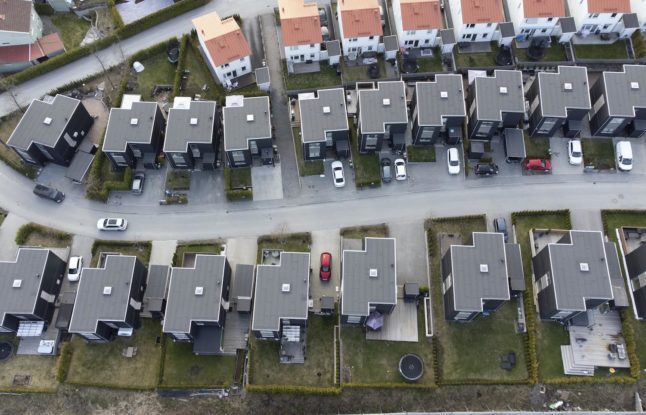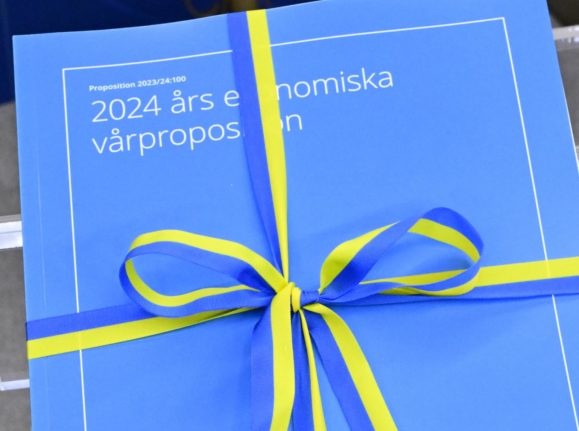Has inflation peaked?
CPI inflation – inflation measured using the consumer price index – has now decreased for the second month in a row, with yearly inflation dropping in March to 10.6 percent from 12 percent in February, and again in April to 10.5 percent.
According to Alexandra Stråberg, head economist at Länsförsäkringar, in comments to the TT newswire, Sweden has “absolutely” passed the peak of inflation, and is also very close to passing the peak of interest rates.
“This is good news,” she told TT. “It’s very positive that core inflation, which is when energy prices are removed, went down more than expected.”
Core inflation fell to 8.4 percent in April compared with 8.9 percent in March. This was lower than expected – the average prediction from analysts for April was 8.7 percent, according to a Bloomberg comparison.
Fruits and vegetables cheaper
Although inflation has decreased two months in a row, this doesn’t mean we’re likely to see prices dropping back to the levels seen at the beginning of last year any time soon, it just means that they will not go up as quickly as they have been doing.
That doesn’t mean that prices won’t go down at all, though – April was the first month to see a drop in food prices since November 2021, with a dip of 1.2 percent in April compared to March.
Fruit and vegetables saw the largest price decreases, falling 3.9 percent and 5.4 percent respectively in April. Despite this, food prices were still 17.5 percent higher in April than 12 months ago.
Cucumbers in particular saw a drop of 31 percent in a month, with a 5 percent drop in the last 12 months.
This could also be related to the seasons – produce grown in Sweden is becoming more available as we move closer to summer, meaning that consumers aren’t paying for produce imported from abroad which is more expensive due in part to the weak krona.
Sweden’s supermarket chains Ica, Coop and Lidl also lowered and froze food prices at the end of March and throughout April, which will have contributed to these figures. These should stay low this month – Ica and Lidl both pledged in late March that this would continue for at least two months.
Good news for homeowners
Homeowners with mortgages are no doubt acutely aware of high interest rates at the moment, with many of our readers getting in touch this year to tell us how their finances have been affected.
Sweden’s key interest rate, set by the central bank, the Riksbank, was raised to 3.5 percent, the highest since 2008, at the end of April, with the bank warning of a further hike of 25 points at its next meeting in June or the meeting after that in September.
Although a drop in inflation doesn’t immediately translate into lower interest rates, it does mean that there’s a higher chance that key interest rates won’t be hiked in June, as it indicates that the Riksbank’s measures to bring down inflation are starting to have an effect.
“The Riksbank has said that it is considering raising rates in either June or September, and this result is good news that could mean the Riksbank decides not to raise rates in June,” Stråberg told TT.
“But that depends if the inflation figures before the Riksbank’s next meeting in June are also positive.”
Rental costs and fees to housing associations (BRF fees) also contributed to lower inflation figures last month, although there could be a delay in changes to BRF fees in particular which could cause issues in the near future.
“It suggests that there haven’t been a lot of concluded rental agreements. Some BRFs could raise fees in line with the Riksbank’s hikes to key interest rates, giving us a delayed effect,” Carl Nilsson, an economist at Swedbank specialising in inflation, told TT.
Nilsson agreed that the inflation figures were positive, although Swedbank’s prognosis that the Riksbank would raise interest rates in both June and September remained the same.
“There will be another inflation figure and there’s a risk that CPI can return a nasty surprise,” he told TT.
Krona remains weak
After April’s inflation rate was announced in mid-May, the krona dropped by around 5 öre against the Euro, indicating that the krona is likely to remain weak for some time.
This is bad news for those who earn in Swedish krona but have expenses abroad, as their salary will not stretch as far is it would have before the krona lost value.
On the other hand, it’s good news for many of our readers living or owning property in Sweden who earn their salary elsewhere, as they will likely be able to buy more in Sweden for the same amount of money in their home currency.



 Please whitelist us to continue reading.
Please whitelist us to continue reading.
Member comments